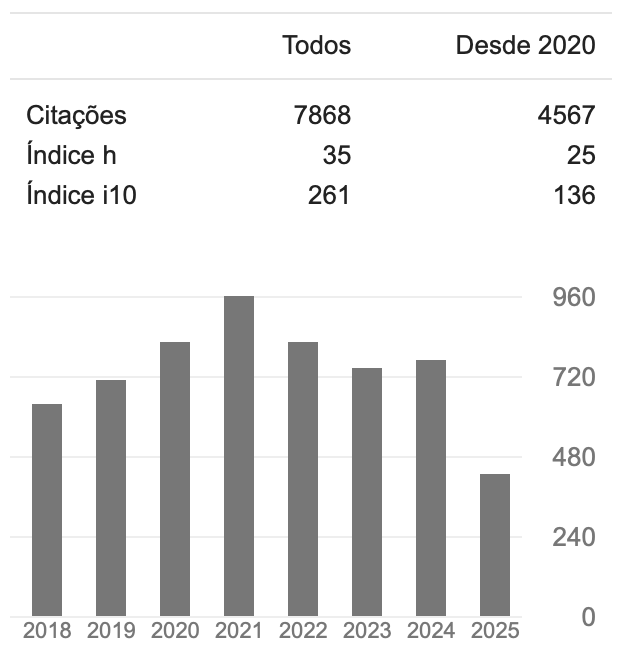Influência de indicadores sociais na incidência e mortalidade da COVID-19 no Brasil em Junho de 2020
DOI:
https://doi.org/10.17765/2176-9206.2022v15n1.e9559Palavras-chave:
COVID-19, Incidência, Mortalidade, Indicadores SociaisResumo
O estudo tem por objetivo analisar a influência de indicadores sociais das regiões e verificar sua correlação com a incidência e mortalidade causada pela COVID-19 no Brasil no período de junho de 2020. Trata-se de um estudo observacional, ecológico e analítico na qual foram incluídas nas análises todas Unidades Federativas brasileiras de 10/06/2020 à 13/06/2020. Considerou-se como variáveis relacionadas à COVID-19: taxa de incidência e mortalidade acumulada por 100 mil habitantes e taxa de letalidade acumulada. Como variáveis independentes, determinou-se: índice de desenvolvimento humano, percentual de pobreza e renda per capita. Verificou-se que regiões mais pobres (Norte e Nordeste) possuem maior incidência, mortalidade e letalidade por COVID-19 se comparado com as regiões mais ricas do (Sudeste, Sul e Centro-oeste). Esses resultados demonstram que os indicadores sociais possuem influência nas taxas de incidência e óbitos por 100 mil habitantes devido a COVID-19, além de apresentar correlações significativas entre si. Os achados do estudo podem ser usados para embasar e dar direcionamento a ações de combate ao COVID-19 no país, levando à criação de políticas públicas bem estruturadas e garantindo eficácia para o enfrentamento da doença em áreas com vulnerabilidade.Downloads
Referências
1. Guo YR, Cao QD, Hong ZS, Tan YY, Chen SD, Jin HJ, Tan KS, Wang DY, Yan Y. The origin, transmission and clinical therapies on coronavirus disease 2019 (COVID-19) outbreak–an update on the status. Military Medical Research. 2020 Dec;7(1):1-0. http://doi.org/10.7150/ijbs.45221
2. Zhong BL, Luo W, Li HM, Zhang QQ, Liu XG, Li WT, Li Y. Knowledge, attitudes, and practices towards COVID-19 among Chinese residents during the rapid rise period of the COVID-19 outbreak: a quick online cross-sectional survey. International journal of biological sciences. 2020;16(10):1745. http://doi.org/10.7150/ijbs.45221
3. Li Q, Guan X, Wu P, Wang X, Zhou L, Tong Y, Ren R, Leung KS, Lau EH, Wong JY, Xing X. Early transmission dynamics in Wuhan, China, of novel coronavirus–infected pneumonia. New England journal of medicine. 2020 Jan 29. https://doi.org/10.1056/NEJMoa2001316
4. Brasil. Ministério da Saúde. Secretária de Vigilância em Saúde. Boletim Epidemiológico Especial - 14. Semana 18. 2020. [cited 2020 Jul 02]. Available from: https://portalarquivos.saude.gov.br/images/pdf/2020/April/27/2020-04-27-18-05h-BEE14-Boletim-do-COE.pdf
5. Brasil. Ministério da Saúde. Secretária de Vigilância em Saúde. Painel Coronavírus. 2020. [cited 2020 Jul 02 2020]. Available from: https://covid.saude.gov.br/
6. Gao Q, Bao L, Mao H, Wang L, Xu K, Yang M, Li Y, Zhu L, Wang N, Lv Z, Gao H. Development of an inactivated vaccine candidate for SARS-CoV-2. Science. 2020 Jul 3;369(6499):77-81.http://doi.org/10.1126/science.abc1932
7. Garcia LP, Duarte E. Intervenções não farmacológicas para o enfrentamento à epidemia da COVID-19 no Brasil. Epidemiol Serv Saúde. 2020;29(2):1-4. http://doi.org/10.5123/S1679-4974202000020000
8. Caetano R, Silva AB, Guedes AC, Paiva CC, Ribeiro GD, Santos DL, Silva RM. Challenges and opportunities for telehealth during the COVID-19 pandemic: ideas on spaces and initiatives in the Brazilian context. Cadernos de Saúde Pública. 2020 Jun 1;36.https://doi.org/10.1590/0102-311x00088920
9. Oh WK. COVID-19 infection in cancer patients: early observations and unanswered questions. Ann Oncol. 2020; S0923-7534(20)36384-5. https://doi.org/10.1016/j.annonc.2020.03.297
10. Werneck, GL; Carvalho, MS. A pandemia de COVID-19 no Brasil: crônica de uma crise sanitária anunciada. Cad. Saúde Pública. 2020;36(5). https://doi.org/10.1590/0102-311X00068820
11. Santos JPCD, Siqueira ASP, Praça HLF, Albuquerque HG. Vulnerabilidade a formas graves de COVID-19: uma análise intramunicipal na cidade do Rio de Janeiro, Brasil. Cad. Saúde Pública. 2020;36:e00075720. https://doi.org/10.1590/0102-311X00075720
12. Anderson RM, Heesterbeek H, Klinkenberg D, Hollingsworth TD. How will country-based mitigation measures influence the course of the COVID-19 epidemic? The Lancet. 2020;395(10228):931–934. https://doi.org/10.1016/S0140-6736(20)30567-5
13. Souza CDF, Machado MF, Carmo RF. Human development, social vulnerability and COVID-19 in Brazil: A study of the social determinants of health. Infect. Dis. Poverty. 2020;9:124. https://doi.org/10.1186/s40249-020-00743-x
14. Lipsitch M, Swerdlow DL, Finelli L. Defining the epidemiology of COVID-19 - studies needed. N Engl J Med. 2020;382(13):1194-1196. https://doi.org/10.1056/NEJMp2002125
15. Mendonça FD, Rocha SS, Pinheiro DLP, Oliveira SV. Região Norte do Brasil e a pandemia de COVID-19: análise socioeconômica e epidemiológica. J Health NPEPS. 2020;5(1):20-37. http://dx.doi.org/10.30681/252610104535
16. Almeida Medeiros A, Barbosa IR, de Lima KC. Epidemia de COVID-19 no Brasil: uma análise dos primeiros 50 dias. Cadernos de Educação, Saúde e Fisioterapia. 2020 Jul 18;7(13). https://doi.org/10.18310/2358-8306.v7n13.a6
17. Sannigrahi S, Pilla F, Basu B, Basu AS, Molter A. Examining the association between socio-demographic composition and COVID-19 fatalities in the European region using spatial regression approach. Sustain. Cities Soc. 2020;62(1):e102418 https://doi.org/10.1016/j.scs.2020.102418
18. Goutte S, Péran T, Porcher T. The role of economic structural factors in determining pandemic mortality rates: Evidence from the COVID-19 outbreak in France. Res. Int. Bus. Finance. 2020;54(1):e101281 https://doi.org/10.1016/j.ribaf.2020.101281
19. Patel JA, Nielsen FB, Badiani AA, Assi S, Unadkat VA, Patel B, Ravindrane R, Wardle H. Poverty, inequality and COVID-19: the forgotten vulnerable. Public health. 2020 Jun;183:110. https://doi.org/10.1016/j.puhe.2020.05.006
20. Maciel JAC, Castro-Silva IL, Farias MR, Análise inicial da correlação espacial entre a incidência de COVID-19 e o desenvolvimento humano nos municípios do estado do Ceará no Brasil. Rev. Bras. Epidemiol. 2020;23(1):e200057. https://doi.org/10.1590/1980-549720200057
21. Andrade EO, Gouveia VV, D’Ávila RL, Carneiro MB, Massud M, Gallo JH. Índice de desenvolvimento em saúde: conceituação e reflexões sobre sua necessidade. Rev. Assoc. Med. Bras. 2012;58(4):413-21. https://doi.org/10.1590/S0104-42302012000400010.
22. Lins-Filho PC, de Araújo MM, de Macêdo TS, de Melo MC, Ferreira AK, da Silva EL, de Melo Freitas JL, de França Caldas Jr A. The impact of socioeconomic vulnerability on COVID-19 out comes and social distancing in Brazil. https://doi.org/10.1590/SciELOPreprints.1126
23. Souza CD, Paiva JP, Leal TC, Silva LF, Santos LG. Evolução espaço temporal da letalidade por COVID-19 no Brasil; 2020. https://doi.org/10.36416/1806-3756/e20200208
24. Silva MH, Procópio IM. A fragilidade do sistema de saúde brasileiro e a vulnerabilidade social diante da COVID-19. Revista Brasileira em Promoção da Saúde. 2020. https://doi.org/10.5020/18061230.2020.10724
Arquivos adicionais
Publicado
Como Citar
Edição
Seção
Licença
A submissão de originais para a revista Saúde e Pesquisa implica na transferência da Carta Concessão de Direitos Autorais, pelos autores, dos direitos de publicação digital para a revista após serem informados do aceite de publicação.A Secretaria Editorial irá fornecer da um modelo de Carta de Concessão de Direitos Autorais, indicando o cumprimento integral de princípios éticos e legislação específica. Os direitos autorais dos artigos publicados nesta revista são de direito do autor, com direitos da revista sobre a primeira publicação. Os autores somente poderão utilizar os mesmos resultados em outras publicações, indicando claramente a revista Saúde e Pesquisa como o meio da publicação original. Em virtude de tratar-se de um periódico de acesso aberto, é permitido o uso gratuito dos artigos, principalmente em aplicações educacionais e científicas, desde que citada a fonte. A Saúde e Pesquisa adota a licença Creative Commons Attribution 4.0 International.
A revista se reserva o direito de efetuar, nos originais, alterações de ordem normativa, ortográfica e gramatical, com vistas a manter o padrão culto da língua e a credibilidade do veículo. Respeitará, no entanto, o estilo de escrever dos autores. Alterações, correções ou sugestões de ordem conceitual serão encaminhadas aos autores, quando necessário. Nesses casos, os artigos, depois de adequados, deverão ser submetidos a nova apreciação. As opiniões emitidas pelos autores dos artigos são de sua exclusiva responsabilidade.


















